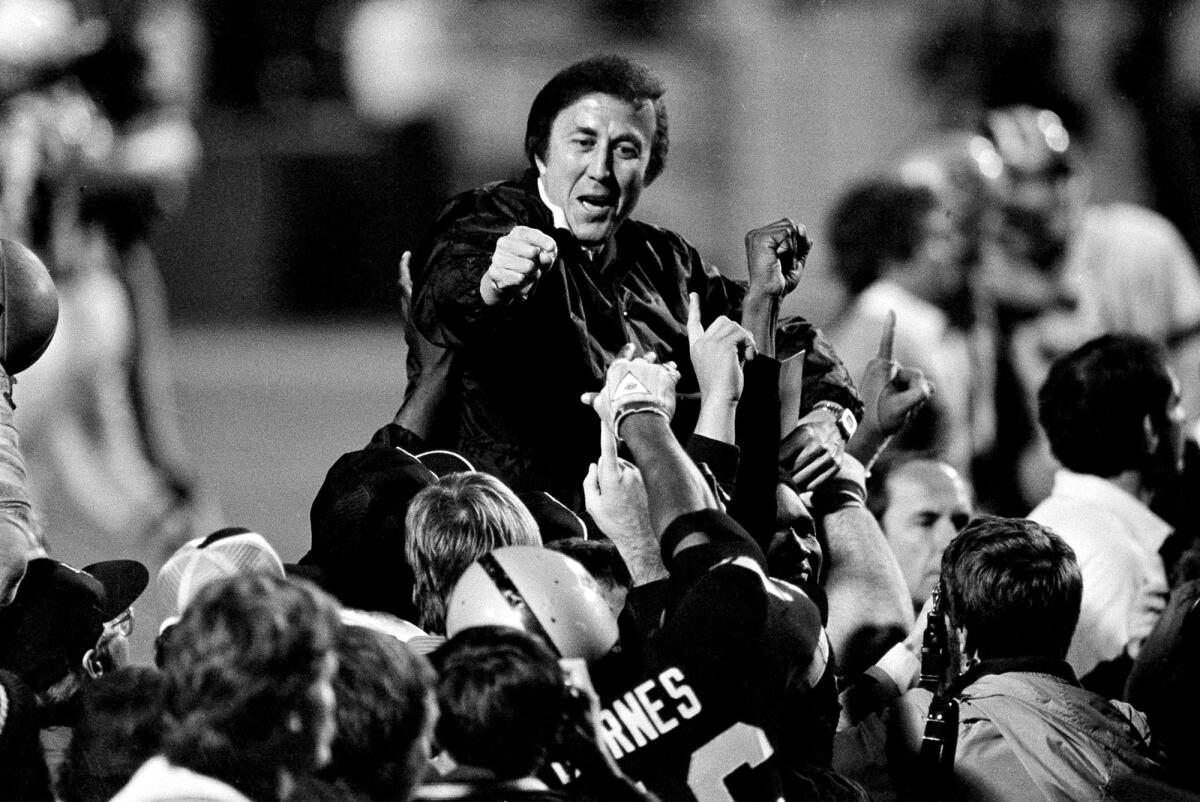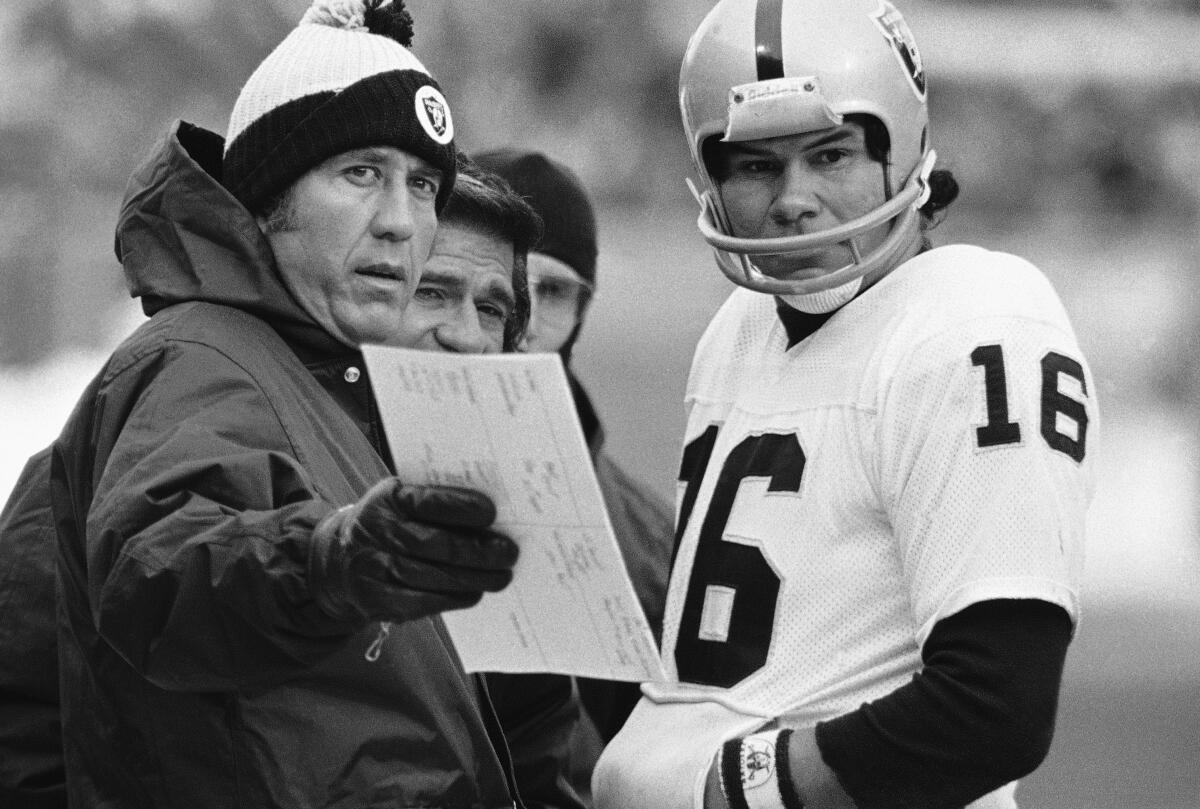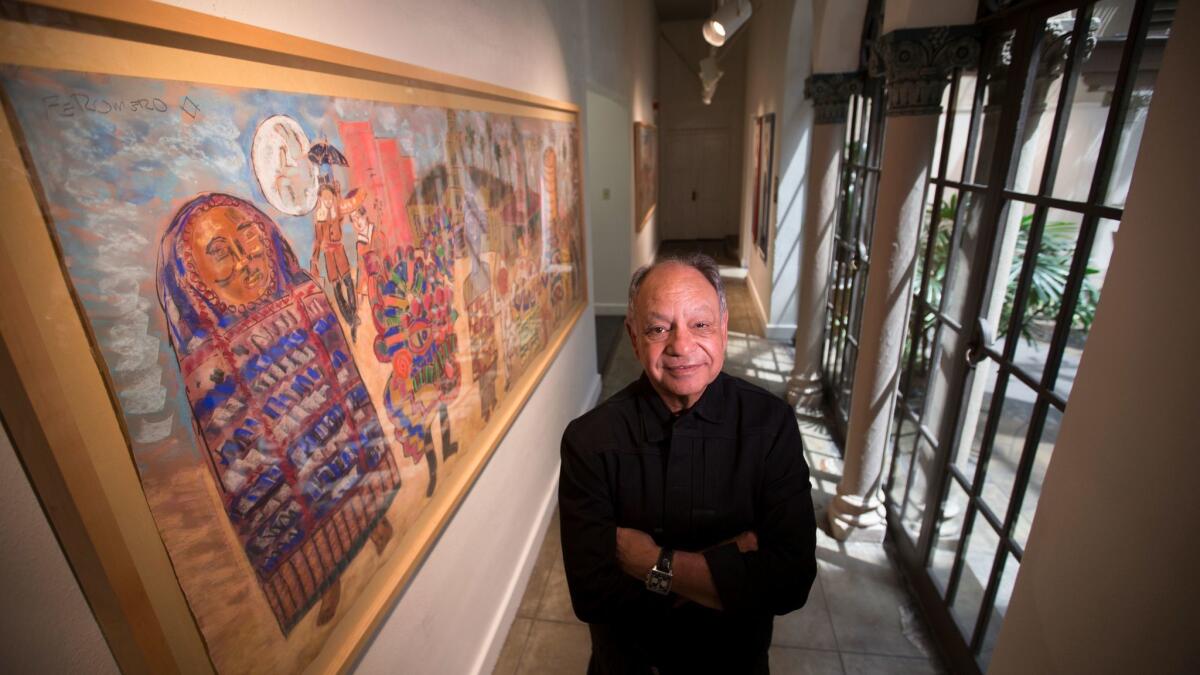Latinx Files: Will Tom Flores finally get his due?

On Feb. 7, millions worldwide will tune in to watch the Kansas City Chiefs (change the name already!) face off against the Tampa Bay Buccaneers in Super Bowl LV. It promises to be a great game, one that pits the greatest quarterback of all time (Tom Brady) against the quarterback most likely to take that distinction away from him (Patrick Mahomes).
I, however, am most anticipating what will take place the day before: the announcement of the 2021 class of inductees into the Pro Football Hall of Fame. The reason? The likely enshrinement of Tom Flores, a Mexican American pioneer who has long deserved the recognition as a coach.
The Pro Football Hall of Fame’s mission is “to honor the heroes of the game” and “to preserve its history,” and no other candidate on this year’s list of finalists fits that bill better than Flores.
He’s a hero to Raiders fans, having led the team to Super Bowl victories in 1981 (when the team played in Oakland) and in 1984 (when it played in Los Angeles). That’s one more than Hall of Fame coach John Madden won.
The Latinx experience chronicled
Get the Latinx Files newsletter for stories that capture the multitudes within our communities.
You may occasionally receive promotional content from the Los Angeles Times.
It’s worth noting that he did it with a Chicano quarterback, Jim Plunkett.
Flores is also one of just two people (the other being Mike Ditka) to have won a Super Bowl ring as a player, as an assistant coach and as a head coach — his former two rings coming in 1970 with Kansas City and 1977 with the Raiders.
In terms of history, Flores has certainly made it several times over. He was the first Hispanic (a term he’s used to identify himself) quarterback in professional football, the first Hispanic player at that position to be named to the Pro Bowl, the first Hispanic head coach in the NFL and the first to win a Super Bowl, and the first Hispanic executive in the NFL.
Not bad for a kid from the San Joaquin Valley, the son of Mexican farmworkers.
And yet despite his impressive resume, Flores has had to wait decades to be recognized. It’s an exclusion so egregious that Coors, the brewery that tried to use “the decade of the Hispanic” in the ’80s to sell beer, launched a campaign that put the Raider legend’s face on Coors Light cans to pressure voters into righting this wrong.
So why do I, a lifelong fan of the Dallas Cowboys, care so much about Flores’ induction? And why should readers of this newsletter who don’t follow sports care as well?
Because as Latinxs, it should matter that people who look like us and whose stories resemble ours get recognized for their excellence. It’s a reminder that our community is capable of doing great things, of not only imagining “cosas chingonas,” as Javier “Chicharito” Hernandez would say, but also making them a reality.
It’s aspirational and inspirational.
“Personally, it’s important for the recognition,” Adam Arellano, a 45-year-old Raiders fan from Santa Maria, Calif., recently told me. “A brown-skinned guy whose family worked the fields like my grandparents and mother did, who achieved and succeeded. It’s good to see that. He embodies the Raiders’ motto of ‘commitment to excellence.’”
It matters to people like Arellano and myself now just as it mattered to members of our community back in the 1980s.

“That is precisely why their success is so significant to Latinos,” the late columnist Frank del Olmo, a trailblazer in his own right, wrote 40 years ago in The Times a week before Super Bowl XV, which featured the Raiders and the Philadelphia Eagles.
“Whether the Raiders win or lose the Super Bowl game, millions of Latinos will be proud simply that Flores and Plunkett are there,” Del Olmo wrote. “For they will be there not as representatives of their people but as competent professionals whose skill, determination and hard work have brought them to the pinnacle of success in their field.”
And it should also matter to the NFL. After all, Flores has done more to grow the sport — as of 2019, it had more than 30 million Latinx fans — than the league’s own half-baked and superficial campaigns during National Hispanic Heritage Month.
Flores is keenly aware of how much he means to the Latinx community.
“I didn’t really realize it until years later — after I did most of my work — how important it was to them,” he said in 2020. “When I traveled around the country I would talk to somebody who would say, ‘My dad watched you play.’ Or ‘My grandfather watched you play and coach, and he cried.’
“You think about those things,” he said. “I tell people, ‘I’m not going in — if I go in — by myself. I’m going in with a lot of people. A lot of fans; a lot of the Raider Nation.’”
Consider subscribing to the Los Angeles Times
Your support helps us deliver the news that matters most. Become a subscriber.
What does ‘deferred enforced departure’ for Venezuelans actually mean?
One of the last things that Donald Trump did as president was to grant deferred enforced departure to Venezuelan nationals living in the United States without legal status. According to Politico, the move was advocated by his daughter Ivanka, who is rumored to be contemplating a challenge to Florida Republican Marco Rubio for his Senate seat.
Trump’s decree essentially provides temporary protection from deportation to an estimated 200,000 Venezuelans currently in this country, and it also gives those who qualify the ability to work legally.
But DED applies only to people who arrived in the U.S. on or before Jan. 20, and it is in effect for a period of 18 months. Unlike temporary protected status, DED does not provide a path to citizenship under the Biden administration’s immigration plan — though Senate Democrats are working on a bill that would extend TPS to Venezuelan nationals.
If you want more information about the specificities of DED, I recommend this in-depth Q&A put together by the Miami Herald.
Here are some stories we read this week that we think you should read
— While I was doing research for the top segment on Tom Flores, friend and fellow journalist Albert Pérez flagged his 2016 interview with the Raider legend in which the former coach states that part of the reason he hadn’t been inducted into the Hall of Fame is that much of the credit for the team’s past success is given to former owner Al Davis. The interview was published in Hoy, the predecessor to Los Angeles Times en Español.
— As I’ve noted in past editions, one of the things I’d like to do in this newsletter is feature the work of student journalists. This week, Austin Martinez, a journalism and Latino media studies student at the University of Texas (Hook ’em Horns!), emailed me this essay on the toll that reporting on the pandemic has taken on her. (Students and teachers: If you’d like to have your work featured in this space, email me at [email protected].)
— A new CNN study has found that white Americans are getting the COVID-19 vaccine at much higher rates than Black Americans and Latinxs. The pandemic has hit these latter communities especially hard; if you’re Black or Latinx (or both), you’re three times more likely to die of COVID-19 than a white person. Last week, my colleagues Julia Wick and Hayley Smith reported on “vaccine chasers” — younger, whiter and more affluent Angelenos from the Westside and the Valley who are going to vaccination centers in Black and Latinx neighborhoods in hopes of getting the shot before they’re supposed to.
— Mexico’s president, Andrés Manuel López Obrador, announced this week that he had COVID-19. Lopez Obrador has downplayed the severity of the pandemic in recent months.
— What’s it like to be uprooted from a place you have called home for a large portion of your life and be taken to a country that saw you be born but is nonetheless foreign to you? Yesterday, the New York Times unveiled a digital project that gives several undocumented immigrants from Mexico who have been deported an opportunity to try to answer this question in their own words.
— Our friends at LAist published the heartbreaking story of the Fajardos, who lost their 4-year-old daughter when she was killed by a driver while walking to school with her mother. More than a year later, the family is still waiting for justice.
— If you picked up this month’s issue of Vogue, which features Vice President Kamala Harris on the cover, you should read my colleague Suzy Exposito’s personal essay on growing up goth in Miami. And if you didn’t, you can find it online here.
— Tuesday marked the first anniversary of the death of Kobe Bryant, his daughter Gianna and seven others in a helicopter crash. The Laker legend wasn’t Latinx, but he was married to one and had a special relationship with our community. The Times’ Sports desk did a series of stories reflecting on his death.
— Cheech Marin’s long-awaited Chicano museum of art, which will go up (in smoke … sorry, I couldn’t help myself) in Riverside, finally has a timetable: It’s expected to open this fall.

Meet our Latinx staff: Gabby Fernandez on LatinoTok
This week, I’d like to introduce you to Gabby Fernandez, a crucial part of The Times’ audience engagement team. If you come across one of the paper’s stories on Twitter, Facebook, Instagram or platforms like Apple News or Flipboard, chances are high that she put it in front of you. Not only does Gabby play a big role in helping the L.A. Times expand its digital presence, but she will also be stepping in to write this newsletter from time to time in the very near future.
I’ve also asked her to tell you, in her own words, about her latest obsession: LatinoTok.
I’ve been on TikTok since November 2019, and I’ve gotten lost down many of its rabbit holes. Since joining and spending more and more of my free time on it, I’ve been on murder mystery-Tok, charcuterie-Tok, ABC’s “The Bachelor”-Tok, Diet Coke-Tok, just to name a few. However, my absolute favorite has been Latino TikTok. There’s something weirdly comforting about an algorithm learning about and catering to your identity while also roasting you and entertaining you.
My favorite users are Jenny Martinez (@jennymartinezzz), whose Mexican recipes have inspired me to make them and lament being lactose intolerant. I also would be remiss if I didn’t mention the @badwiggies (Xilena, Julie and Emely), whose colorful wigs and coordinated parking lot dance moves have garnered over 3 million followers and the attention of huge stars like James Charles. Also, who doesn’t want to see a rendition of a cultural reset like “Gasolina” played on a violin? Latino TikTok found me, and I wouldn’t have it any other way.
The Latinx experience chronicled
Get the Latinx Files newsletter for stories that capture the multitudes within our communities.
You may occasionally receive promotional content from the Los Angeles Times.




